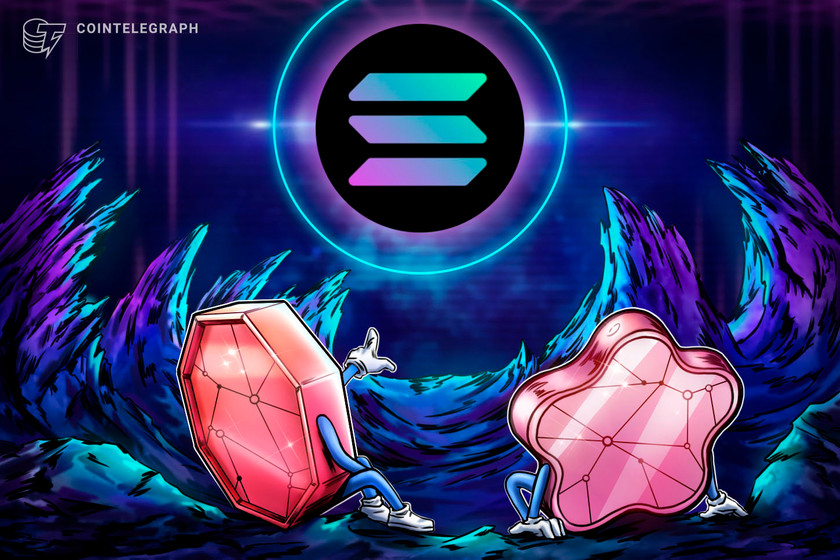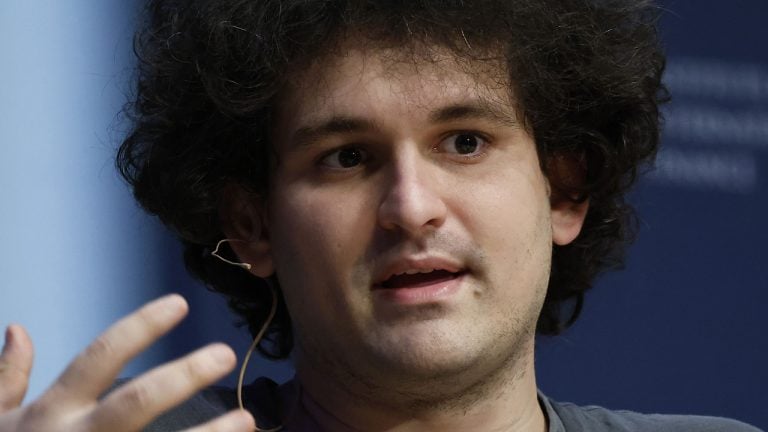
A Hollywood director has reportedly made a 575% profit from trading the popular meme asset Dogecoin (DOGE) with funds originally reserved for a Netflix show. According to a new report by The New York Times, filmmaker Carl Erik Rinsch – who received $55 million from the marquee streaming service between 2020 and 2021 to fund […]
The post Hollywood Director Booked 575% Profit on Dogecoin Bet Funded With Diverted Netflix Budget: Report appeared first on The Daily Hodl.

Carl Erik Rinsch reportedly used nearly $11 million of his Netflix show’s budget to gamble with stocks and crypto and made millions on a single Dogecoin bet.
The director of Netflix’s sci-fi series Conquest reportedly used $4 million from the show’s budget to bet on Dogecoin (DOGE) and made $27 million in the process.
Now the director, Carl Erik Rinsch, wants another $14 million from Netflix, according to a Nov. 22 report in The New York Times citing a confidential arbitration proceeding.
The Times report details the behind-the-scenes drama of Rinsch’s sci-fi Netflix series Conquest, which the streaming giant doled out $55 million to make, but is yet to receive an episode.
In March 2020, 16 months after Netflix bought Rinsch’s idea and provided him with an initial budget of $44 million, the director asked for more funds. Netflix obliged and wired him $11 million on the condition he finished the show.
According to financial statements obtained by the Times Rinsch used $10.5 million from the fresh funding to gamble on the stock market and allegedly lost nearly $6 million in just a few weeks by placing options bets on pharmaceutical companies and the S&P 500,
With a little over $4 million left, Rinsch transferred the money to the crypto exchange Kraken and went all in on DOGE. When he liquidated in May 2021, he withdrew around $27 million, per an account statement seen by the Times
Wild Netflix story.
— Trung Phan (@TrungTPhan) November 22, 2023
In 2018, it bought a sci-fi series from director Carl Rinsch. By 2020, Netflix spent $44m on the show.
Production was floundering and Rinsch demanded $11m more. He took the funds and quickly lost ~$6m in pharma option YOLOs.
A bit later, he took $4m and… pic.twitter.com/JnvY09Op9A
“Thank you and god bless crypto,” Rinsch wrote in a chat with a Kraken representative.
With the proceeds, Rinsch allegedly spent nearly $9 million on high-end furniture, designer clothing, an over $380,000 luxury watch, five Rolls-Royces and a Ferrari, according to a forensic accountant hired by Rinsch’s ex-wife for divorce proceedings.
Related: Crypto traders are looking at Dogecoin (DOGE) again — Here’s why
The Times said Rinsch launched a confidential arbitration proceeding against Netflix, claiming the streaming service breached its contract and owes him $14 million in damages. Netflix denies owing Rinsch anything and hasreferred to his demands as a shakedown.

In a deposition, Rinsch said the items in his almost $9 million spending spree were props for Conquest. He later argued in his case against Netflix that the money was actually his and he’s owed another $14 million.
A ruling on the case is expected soon as it was heard before an arbitrator earlier in November.
Magazine: Cryptocurrency trading addiction — What to look out for and how it is treated

The positions come with six-figure salaries, ranging from $450,000 to $650,000 for the Technical Director role and $300,000 to $900,000 for the Product Manager position.
As the Screen Actors Guild‐American Federation of Television and Radio Artists/Writers Guild of America (SAG-AFTRA/WGA) strike over the use of artificial intelligence (AI) in film and TV production enters its second week, Netflix is advertising for AI developers to fill Product Manager and Technical Director positions within its R&D Labs and Machine Learning division.
In the job posting, Netflix stated that they are establishing a fresh product management position with the aim of enhancing the effectiveness of their Machine Learning Platform.
According to Netflix, both roles will be located at the stream platform's headquarters in Los Gatos, California, but they offer the flexibility to work remotely. The positions come with six-figure salaries, ranging from $450,000 to $650,000 for the Technical Director role and $300,000 to $900,000 for the Product Manager position.
Both writers and actors in Hollywood share concerns about the increasing use of AI. Writers fear that generative AI tools, such as ChatGPT, may potentially replace their jobs, while actors are alarmed about their faces and bodies being scanned for background roles. This data capture raises worries about the indefinite use of their likeness for minimal or no compensation.
The job advertisement highlights the significant demand for machine learning and AI expertise, particularly given the rapid advancement of AI since the introduction of OpenAI's ChatGPT in November. Both positions necessitate experience in game design and the machine learning domain. Interestingly, neither role explicitly mandates a college degree as a requirement.
Related: SEC passes new ‘conflict of interest’ rules governing how brokers can use AI
As per the Netflix LinkedIn job posting, the vacancies emerged last week, which interestingly coincided with the breakdown of negotiations between SAG-AFTRA and the Alliance of Motion Picture and Television Producers (AMPTP). Consequently, the actors showing solidarity with the striking writers decided to join them on the picket line.
This development has added a layer of significance to the situation, with both parties expressing their concerns and demands through collective action during this critical period of contract negotiations in the film and television industry.
Magazine: AI Eye: AI’s trained on AI content go MAD, is Threads a loss leader for AI data?
 Scottish-Salvadoran driver Sebastian Melrose has made his debut in the Porsche Carrera Cup racing championship. The 25-year-old, who took part in a popular Netflix TV series last year, drives a Bitcoin-branded 911 that features the flag of crypto-friendly El Salvador on its rooftop. Bitcoin Racing Team Joins Porsche Carrera Cup With Netflix Celebrity in the […]
Scottish-Salvadoran driver Sebastian Melrose has made his debut in the Porsche Carrera Cup racing championship. The 25-year-old, who took part in a popular Netflix TV series last year, drives a Bitcoin-branded 911 that features the flag of crypto-friendly El Salvador on its rooftop. Bitcoin Racing Team Joins Porsche Carrera Cup With Netflix Celebrity in the […]
From streaming videos to cloud storage solutions, cloud computing has become an integral part of our everyday lives.
Cloud computing has become an important part of our lives, whether we realize it or not. Many of the services and applications we use on a daily basis, such as messaging and streaming music and video, are powered by cloud computing.
Here are real-world cloud computing examples to know.
Netflix uses cloud computing to provide streaming services to millions of users worldwide. By hosting its content on cloud servers, it can ensure reliable and scalable delivery to a global audience.
Netflix uses a variety of cloud computing services and technologies, including Amazon Web Services (AWS) and content delivery networks (CDNs). The majority of Netflix's cloud computing requirements, including storage, processing power and data management, are met by AWS. Netflix makes use of CDNs to guarantee that its users receive its content fast and consistently. To enable users to access the content from the closest location, CDNs keep copies of the content in many locations around the globe.
Also, netflix uses CDN (Content Delivery Networks) and they have servers around the world hosted on AWS (Amazon Web Services). The file/video you request is sent to the Content Delivery Network closest to you.
— Timi (@_timiowo) April 13, 2020
Slack is a cloud-based messaging and collaboration platform that allows teams to communicate and collaborate in real time. It utilizes cloud computing to provide scalability, reliability and accessibility to its users. Slack's cloud infrastructure allows it to support a large number of users and messages, and to provide seamless access to its platform from multiple devices and locations.
Slack runs on cloud-based architecture that is designed to be highly available and fault-tolerant. It uses multiple data centers to ensure that its services are always available, even in the event of a failure in one data center.
Salesforce provides customer relationship management (CRM) services through cloud computing. This allows businesses to manage customer data, automate workflows and streamline sales processes.
Salesforce cloud computing involves the use of a variety of cloud services and technologies, including:
Airbnb is a cloud-based platform for the sharing economy. Using Airbnb's website or mobile app, hosts may offer their properties for rent, and visitors can book such rentals. Massive amounts of data, including property listings, booking information and customer preferences, are stored and managed by Airbnb using cloud computing.
As a result, the platform can offer features like real-time availability and pricing, secure payment processing, and customized recommendations that make the experience easy for both guests and hosts.
Air is the new Cloud. Airbnb, Airtable, Airbyte, Airbase, Airkit...
— Dmitriy Ryaboy (@squarecog) March 23, 2022
Uber uses cloud computing to manage its ride-hailing platform, including real-time location tracking, trip routing and fare calculation. This allows the platform to provide fast and reliable transportation services, with features such as real-time payment processing and personalized ride options. Cloud computing also enables Uber to scale its services to meet demand, provide 24/7 support, and ensure the safety and security of riders and drivers.
Related: An overview of peer-to-peer ridesharing using blockchain
GitHub is a cloud-based platform that provides hosting for software development and version control using Git. It allows developers to store and collaborate on code with their team members, manage project tasks and track changes to code over time.
Please don't apply for senior dev roles unless your GitHub looks like this pic.twitter.com/6wptzkrMb2
— Nat Miletic (@natmiletic) February 27, 2023
While GitHub itself is not a cloud computing platform per se, it is often used in conjunction with cloud computing services such as AWS, Google Cloud Platform and Microsoft Azure. Developers can use GitHub to host their code and then deploy it to the cloud using services such as AWS Elastic Beanstalk or Microsoft Azure App Service.
Google Cloud Platform is a cloud computing platform provided by Google that enables users to build, deploy, and scale applications and services using a wide range of computing resources. It is an example of cloud computing because it provides access to a wide range of computing resources on demand, including virtual machines, storage, networking, databases and other services, all delivered through the internet.
One example of how Google Cloud can be used is for building and deploying web applications. Developers can use Google Cloud's compute resources to host their application code and data, and use services such as load balancing, autoscaling and container orchestration to manage the application's performance and availability. They can also use Google Cloud's machine learning services to add intelligent features to their applications, such as image recognition or natural language processing.
No, blockchain is not a part of cloud computing. While both blockchain and cloud computing are used in the context of modern computing, they are distinct technologies with different characteristics and use cases.
Cloud computing is a delivery model for computing resources such as servers, storage and software applications over the internet. Users who use cloud computing can use these services whenever they need to without having to buy and maintain their own physical IT infrastructure.
Related: 7 modern technology examples that don’t need electricity
Blockchain, on the other hand, is a distributed digital ledger technology that records transactions in a safe, open and unchangeable way. Blockchain is frequently used to build relationships of trust between parties who do not already know or trust one another. In order to prevent any one person or entity from tampering with the data, it accomplishes this by using a decentralized network of computers to verify and record transactions.
While it is possible to use cloud computing to host blockchain-based applications, blockchain is not inherently a part of cloud computing.

New court documents reveal that collapsed crypto exchange FTX owes money to a slew of marquee businesses, including Apple and Netflix. FTX, which went bankrupt in November, allegedly owed billions of dollars to a number of prominent companies before it collapsed, the extent revealed in bankruptcy court filings. Some of those companies include tech giant […]
The post New Court Documents Show Apple, Netflix, Binance and Coinbase Among Creditors Owed Money by FTX appeared first on The Daily Hodl.

The migration of Solana's top two NFT projects to Polygon and Ethereum is set for the first quarter of 2023 on an opt-in basis.
Nonfungible token (NFT) firm Dust Labs is migrating its two top-performing Solana NFT projects — DeGods and y00ts — onto Ethereum and Polygon in a bid to expand their adoption.
The news was announced on DeGods and y00ts Twitter page on Dec. 25, with both NFT projects expected to be officially bridged onto Ethereum and Polygon respectively in the first quarter of 2023.
Rohun Vora — the creator of DeGods and y00ts who is known by the alias Frank III — said the decision was made to “explore new opportunities” and to allow for the continued growth of the collection. The move will also see the DUST token — used to buy, sell and mint NFTs on the DeGods ecosystem — also be bridged onto Ethereum and Polygon.
It's just the beginning. pic.twitter.com/F3vxzXQAOy
— Frank III (@frankdegods) December 25, 2022
Vora confirmed that two NFT projects will still remain on Solana for the time being, and in a separate post responding to a Twitter user, confirmed that the bridge/migration will be owner "opt-in."
During a Dec. 26 Twitter spaces, Vora explained to 66,000 listeners that it was simply a matter of getting the NFT projects on the platforms that he sees will drive the next wave of NFT adoption.
In his reasoning, he made parallels to the intense battle for intellectual property (IP) between streaming services such as Netflix, Disney Plus and HBO Max — suggesting that the streaming service that secures the best IP will ultimately win the lion’s share of viewers, which then attracts better projects.
“They’re trying to get the best IP on their streaming services because that IP is ultimately going to drive the growth on that platform.”
“Once you get enough IP on the platform it becomes a virtuous cycle, people want to be on Netflix because that’s just the brand and the place to be,” he added.
He said a similar battle is playing out between different blockchains that are trying to build the best NFT platforms, noting that as NFTs are driven by attention, there is an opportunity for “virtuous cycles” that would create a network effect for NFT projects.
From there, “the metrics, the volume and the liquidity will follow that,” he added.
Vora said his bullish view on Polygon for NFTs was influenced by the fact that Disney, Adidas, Nike and Reddit chose Polygon as their NFT platform of choice.
Vora also said that he had received grant offers from many other platforms, most of which were much larger than what was offered by Polygon, but Polygon provided y00ts with the best opportunities moving forward.
“Polygon by far was one of the lowest, if not the lowest in terms of dollar value, but we went with Polygon because we see a lot of opportunity on a strategic level and that’s what excites me and should excite you holders more than anything.”
Related: Solana TVL drops by almost one-third as FTX turmoil rocks ecosystem: Finance Redefined
The news has only added to the growing list of concerns for Solana, which has seen the total value locked (TVL) on the ecosystem fall 97.88% from a peak of $10.17 billion to $215M at the time of writing, according to decentralized finance data aggregator DefiLlama.
Solana co-founder Anatoly Yakovenko shared his “bittersweet” feeling on the news that the NFT projects would no longer “100% focus on Solana” to his 223,600 Twitter followers on Dec. 26, but accepted the “reality” that these projects want to expand their reach.
But controversial figure Ben “Bitboy” Armstrong and a fair share of his 1 million Twitter followers weren’t so optimistic on Solana’s future, with 70% of 11,881 voters in a poll voting “Yes” to “Is Solana dead.”
Let’s check the temperature on #solana now that the top 2 NFT projects are leaving $SOL.
— Ben Armstrong (@Bitboy_Crypto) December 26, 2022
Is Solana dead?
According to DappRadar, both the y00ts and DeGods NFT collections are ranked first and second in terms of fiat transaction volume on Solana over the last 30 days.
 After the FTX collapse, the story seems as though it came from a financial thriller based on fiction and made-up characters. However, the story and the people behind it are very real and today’s streaming giants like Amazon, Apple, and Netflix are vying to get the rights to tell the FTX tale. ‘Multiple’ Film Adaptations […]
After the FTX collapse, the story seems as though it came from a financial thriller based on fiction and made-up characters. However, the story and the people behind it are very real and today’s streaming giants like Amazon, Apple, and Netflix are vying to get the rights to tell the FTX tale. ‘Multiple’ Film Adaptations […]
Desperate to boost revenues, Netflix announced in July that it would be launching a cheaper subscription tier that features commercials.
Streaming giant Netflix has reportedly banned cryptocurrency-related commercials on its ad-supported subscription tier, which is scheduled to launch in November months ahead of schedule.
Citing local sources, The Sydney Morning Herald reported Monday that Netflix has decided to reject all advertising campaigns related to politics, gambling and cryptocurrency on its new subscription tier. The new tier will also not run ads selling products to children. The same sources indicated that restrictions on pharmaceutical ads were also being considered.
According to Variety, Netflix has moved up the timeline for launching its cheaper ad-supported tier to November to compete with Disney+, which is launching its own ad-based plan on Dec. 8. Initially, Netflix was planning to launch its ad-supported tier at the start of 2023.
Netflix's new subscription tier will go live on Nov. 1 in several countries, including the United States, Canada, United Kingdom, Germany and France, Variety said.
Related: Netflix‘s crypto swindler documentary draws wild community reaction
With global subscribers declining in consecutive quarters, Netflix announced in July it would launch a new ad-supported service to boost revenues. In the second quarter, the streaming giant lost 970,000 paid subscribers after losing 200,000 in the first three months of 2022. Faced with slowing revenue growth, Netflix disclosed in June it would cut costs to keep its margins at 20%.
Due to regulatory scrutiny, crypto bans are nothing new for the digital asset industry. In 2018, social media giant Meta (formerly Facebook) banned crypto ads across its platform before reinstating them later in the year. In 2021, Google-parent Alphabet reversed a ban on crypto-related advertisements, allowing exchanges and wallet operators to again promote their services on the search engine.